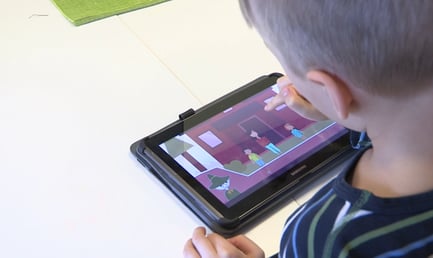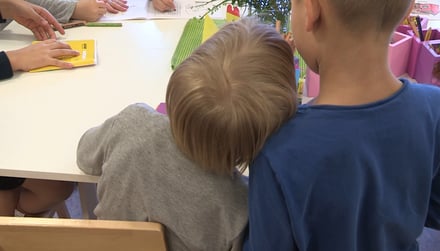
Moomin Language School supports children’s intrinsic motivation and the development of a positive learner self-image by providing children with experiences of success, writes Milja Näsi.
When writing my master’s thesis, I had the opportunity to study Moomin Language School and its effect on preschool children and their intrinsic motivation in foreign language learning. For four weeks, I observed six-year-old children’s daily exercises on the tablet and held weekly playful lessons where we sang, played and experimented with words in a foreign language. In this post, I go shortly through the results of my master’s thesis.
There are two types of motivation: intrinsic and extrinsic. Intrinsic motivation stems from a person’s personal interest and curiosity and it includes excitement, creativity and effort. Extrinsic motivation can include the same elements associated with positive action, but the action is driven by other people’s expectations, rewards and punishments. For learning, the best motivation is intrinsic motivation which directs one to explore, seek challenges and learn more. In order to foster intrinsic motivation, one must feel independent and competent. When it comes to digital learning environments, it’s important that they inspire feelings significant to intrinsic motivation. One major benefit to using digital learning applications is that they’re gamified and play-like, which creates the image of positive activity in children’s minds.
Learning application: fostering independence and competence
Moomin Language School supports children’s feelings of independence by giving them the opportunity to advance at their own pace in the learning application and by giving them agency over their own actions. Children have their own profiles in the application; they advance at their own pace doing exercises independently; they get to choose their favorite Moomin character; and they can use the extra exercises if they have the time. Especially the language lab, where children can record their own speech, turned out to be a definite favorite during my study – one child commented: “It’s so much fun, it makes me laugh!”
Children’s feelings of competence are supported in Moomin Language School by giving them challenges at an adequate level – challenges which help children strengthen their trust in their own abilities and in turn increases their intrinsic motivation. First children are challenged as they learn to use the application and the various exercises, and then a weekly challenge is brought on by the weekly changing vocabulary. The virtual stars that the children receive from each exercise enforce the feeling of competence, because they inform children of their progress in a positive way. “Full scores! and “Yes, three stars!” are just a couple of examples of the excited exclamations heard among the children.

Playful lessons: safety and a feeling of togetherness
The feelings of independence and competence integral to intrinsic motivation get strengthened in an environment where children feel safe and have a sense of togetherness with the group. Moomin Language School’s playful lessons offer such an environment and are therefore central to strengthening motivation. In these interactional sessions the new vocabulary is activated and used with other children and the teacher in a familiar environment using easy songs and games.
The teacher’s role proved to be important. A kindergarten teacher or a nurse is in charge of the conditions in which Moomin Language School is used. In the best case, these conditions help create and maintain intrinsic motivation. A positive and encouraging attitude towards both the use of the digital application and organizing the playful lessons is extremely important.

Moomin Language School has created a digital learning application and a plan how the language learned in the application becomes a part of the everyday life through social interaction. This combination of digital and non-digital activity is perfectly in line with the Finnish core curriculum for early childhood education and care and the Finnish core curriculum for basic education, both of which emphasize the use of ICT to support learning.
Moomin Language School supports and strengthens children’s technology learning and a positive learner self-image by providing children with experiences of success.
Milja Näsi is a primary school teacher student who studied Moomin Language School in her master’s thesis in autumn 2016. The thesis was published in spring 2017.


